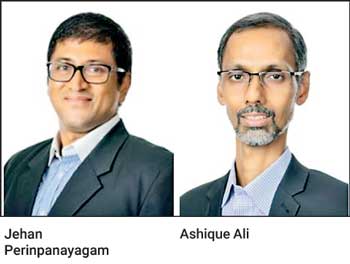Friday Feb 20, 2026
Friday Feb 20, 2026
Tuesday, 30 January 2024 00:55 - - {{hitsCtrl.values.hits}}
 SLASSCOM has been at the forefront of advocating a comprehensive strategy dedicated to catalysing transformative initiatives within the nation’s IT/BPM sector. SLASSCOM Chairman Jehan Perinpanayagam and Immediate past Chairman Ashique Ali shared insights into their strategic vision and plans for the upcoming year.
SLASSCOM has been at the forefront of advocating a comprehensive strategy dedicated to catalysing transformative initiatives within the nation’s IT/BPM sector. SLASSCOM Chairman Jehan Perinpanayagam and Immediate past Chairman Ashique Ali shared insights into their strategic vision and plans for the upcoming year.
At the core of SLASSCOM’s mission is a dedication to nurturing talent. Ashique Ali outlined several initiatives addressing the industry’s skills gap, with a notable example being the ‘Tech Kids’ program that has reached over 12,000 students from Grade 4 to 10 through 370 Code Clubs. The goal is to expand to 150 national schools, paving the way for a future generation of tech talent.
Jehan highlighted the success of the ‘Future Careers Bridge’ program for school leavers, noting an enrolment of 33,000 students and support from 14 partners and 61 institutes. The program introduced seven innovative career tracks in 2023 and collaborated with IBM to launch the IBM SkillsBuild Platform, offering access to 1,000+ courses on emerging technologies. The SLASSCOM Academy, with over 100 trainers and numerous active users, plays a crucial role in up skilling and reskilling. Jehan mentioned reaching 35,000+ students through regional IT/BPM weeks and career fairs.
Top of Form
Ashique discussed the Graduate to Career (G2C) program by SLASSCOM, emphasising its focus on enhancing technical expertise and soft skills for undergraduates and graduates. The initiative fosters collaboration among students, academia, and industry to align graduate capabilities with the sought-after skills in the IT/BPM industry. Ashique mentioned the success of the program, securing 14 university engagement agreements to date.
Moreover, the National Future Talent Initiative (NFTI), designed to inspire a passion for IT/BPM careers, entrepreneurship, and teaching IT, is supported by key stakeholders that include SLASSCOM, FITIS, CSSL, BCS Sri Lanka, state and non-state universities, ICTA, SLANSHE, University Grants Commission (UGC) and the Ministry of Education, collectively championing the cause. This comprehensive approach significantly contributes towards fostering a robust ecosystem for the IT/BPM industry in the future.
Ashique explained the pivotal role played by SLASSCOM’s Global Trade and Investments Forum in linking Sri Lankan enterprises with international opportunities, boosting trade, attracting investments, and strengthening the nation’s business ecosystem. Jehan said that SLASSCOM is determined to further enhance Sri Lanka’s international profile by collaborating with Government bodies and promoting the IOI brand.
SLASSCOM’s Ingenuity Awards, a platform for honouring tech innovators in Sri Lanka is set to expand its impact by integrating with the Global Innovation Awards, aiming to propel Sri Lankan tech innovators onto the global stage for international recognition and influence.
SLASSCOM has reached significant milestones in its ESG endeavours, emphasising its commitment to sustainability and ethical business practices, with member companies of SLASSCOM aligning with the UN’s 17 Sustainable Development Goals and 10 Principles.
Having introduced an ESG fundamentals module and two initiatives centred on mental well-being and digital health that provides a comprehensive approach to employee welfare, SLASSCOM further introduced 11 sustainability policies aimed at encouraging organisations to operate as responsible businesses. The SLASSCOM CEO Starter Pack, developed in partnership with Virtusa, has garnered commitments from 42 member companies, spanning startups to small and medium-sized enterprises.
SLASSCOM’s advocacy has played a pivotal role in shaping favourable policies for Sri Lanka’s IT/BPM industry. Notable achievements include removing mandatory conversion of foreign exchange earnings, lifting the suspension on IT equipment imports, and reforming labour laws. Ongoing efforts focus on attracting venture capital, facilitating visas for entrepreneurs and foreign talent, and liberalising the service sector through bilateral agreements and trade blocs.
Playing a consultative role in the formulations of the Government’s Digital Economy Strategy, National Artificial Intelligence (AI) Strategy, and reforms to Education Policy, the association has pledged support for the DigiEcon 2030 roadmap which envisions the digital economy to contribute 15% to the nation’s GDP.